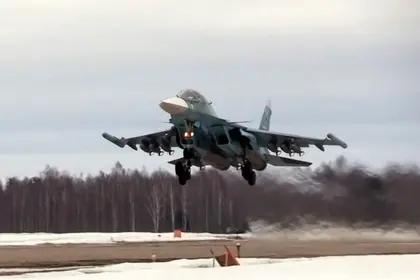Russian frustration boiled over in the wake of the destruction of seven of Russia’s most advanced combat jets over a little more than five days, but pro-Kremlin narratives were badly split on why it happened and whom to blame for the close to $300 million in losses, not counting the pilots.
Ukrainian air force spokesmen citing battlefield video and radar tracking data on Feb. 17 claimed air defenses knocked down two Su-34 attack jets ($36 million each) and one Su-35 ($85 million each) fighter, followed by the Feb. 18 destruction of another Su-34, and the Feb. 19 shootdown of another Su-34 and Su-35.
JOIN US ON TELEGRAM
Follow our coverage of the war on the @Kyivpost_official.
According to open-source tallies, it was likely the worst three-day period of Russian Air Force losses in flight operations, with seven of eight highly trained and difficult-to-replace aircrew dead, since five military aircraft were shot down over western Russia on May 17, 2023 in a series of air ambushes.
“This (Feb. 19) was a black day for our air forces. In the Kherson (southern) sector in a matter of seconds, we lost three Su-34 jets. We pass on our condolences to the families and friends of the dead,” wrote the VDV Za Chenost I Spravedlivost, a pro-Kremlin military writer blogging mostly on Russian paratrooper operations along the war’s southern front.
Most if not all the losses were the fault of Russian senior military commanders who ignored warnings by him and others that the Armed Forces of Ukraine (AFU) operated modern air defense systems led by the US-made Patriot anti-aircraft missile, and that ordering Russian aircraft too close to the long-range American weapon was near suicidal, he said.

Moscow Claims AFU’s Best Troops ‘Ground Down’, Kyiv’s 2025 War Plans ‘Derailed’
“We have been warning for a long time that this (close approaches to Ukrainian lines by Russian military aircraft,) is a very dangerous operation... These warnings have been ignored. Unfortunately, it was only a matter of time before a tragedy like today would take place,” VDV complained.
General Mikhail Teplinskiy, overall commander of Russian joint forces south, was directly responsible for the losses caused, as well as stalled ground operations across the southern sector, the milblogger fumed: “He is probably the first general in the history of Russia who has lost battles on land, at sea and in the air. Teplinskiy should be sacked immediately. He has had more than enough chances.”
Russian military blogger Vladimir Romanov blamed badly trained ground controllers forced to operate primitive equipment, and made responsible for tracking wartime air strikes, for failing to realize air force jets had flown too close to Ukrainian defenses or being unable to inform pilots of the danger.
Russian air traffic controllers often have little idea where an air strike is or might be heading, and the problem has existed for years, but senior military leadership preferred to ignore the shortfalls rather than resolve them, Romanov charged in a Feb. 19 diatribe.
“The root of the problem is the absence of normal communications systems in our air defense forces,” he wrote.
Roman Alekhin, a Moscow-based volunteer with more than 100,000 Telegram followers, said it wasn’t bad air traffic control at all, but rather trigger-happy Russian air defenses accidentally shooting down friendly combat jets either because of poorly functioning identification equipment, or incompetence.
Ukraine’s military doesn’t have weapons capable of hitting planes 150-200 km. from the front line, Alekhin argued.
Voenniy Osvedomitel, one of Russia’s best-known military bloggers with more than a half million subscribers, likewise asserted Ukrainian air defenses had nothing to do with the losses, it was all a red-on-red accident: “This is the third day that he has already seen the second loss of a Su-35 to ‘friendly fire.’ This time, unfortunately, the pilot died. We have written clearly about how the systematic problems of coordination between air defense forces and air force aviation is not being addressed, for already two years, and over and over we have had the same tragedy. This most recent time was no exception,” a Feb. 19 post said.
“Most of the milbloggers have written off today’s losses on ‘friendly fire’, because, supposedly, the (vulgar word for Ukrainians) don’t have any way to hit targets at that distance from the front line,” VDV shot back a few hours later. “We inform you, they have such weapons, and everyone is perfectly aware of it. And of the fact, that in critical sectors the enemy has deployed new, powerful air defense weapons, besides Patriot, we have told you about more than once.”
Ukrainian President Volodymyr Zelensky in a Feb. 2 nightly video address said that “two new air defense systems… that could shoot down anything” had recently arrived in country and “will be protecting the regions.” He offered no details on the type of air defense system received.
According to open-source reports, exclusive of the systems mentioned by Zelensky, Ukraine likely operates four state-of-the-art long-range air defense systems, one stationary Patriot battery donated by the United States, two mobile Patriot batteries donated by Germany, and a single mobile French-Italian SAMP/T battery. Their locations are a Ukrainian military secret.
Recent successful Patriot engagements of Russian aircraft include a series of Dec. 23 intercepts destroying three Russian Su-34 attack jets approaching Ukrainian air space from the Black Sea, reportedly in a few minutes.
On Jan. 24 a Patriot launched into air space above Russia’s western Belgorod Oblast’ hit and destroyed a Russia Il-76 transport plane, killing all on board, according to Kremlin claims including 65 Ukrainian prisoners of war. Ukrainian officials have confirmed the shootdown but questioned whether any POWs were on board.
You can also highlight the text and press Ctrl + Enter






